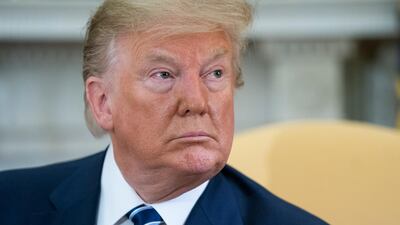Oil prices rallied to their highest in three-weeks as geopolitical tensions and the prospect of heavier US sanctions against Tehran tightened the markets.
Brent, the benchmark for light, sweet crude was trading at $65.18 at 3.21pm UAE time, reversing the earlier bearishness forced by oversupply of US crude and trade tensions with China.
West Texas Intermediate surged 13 per cent from June 12 as markets reflected worry over escalation of tension in the Middle East, home to much of the world's spare oil capacity.
On Monday, US President Donald Trump tweeted that Washington, which has a naval fleet stationed in Bahrain, was considering demanding compensation to protect vessels transiting the Strait of Hormuz.
"China gets 91% of its Oil from the Straight [sic], Japan 62%, & many other countries likewise. So why are we protecting the shipping lanes for other countries (many years) for zero compensation. All of these countries should be protecting their own ships on what has always been...." he tweeted.
The Strait of Hormuz, which President Trump referred to in his tweet, is the oil trade's most strategic chokepoint. It allows for the transport of a third of the world's crude, accounting for 18.5 million barrels per day, making oil prices particularly sensitive to conflict in the region.
Two tankers, operated by Japanese and Norwegian shipping firms and carrying crude and product from Saudi Arabia and the UAE, came under attack in the Gulf of Oman last week. The attacks came a month after four tankers, including two belonging to Saudi Aramco, suffered significant damage in sabotage attacks off the coast of the UAE emirate of Fujairah. The attacks failed to rally prices, which remained impacted by low demand and high supply.
However, the downing of a US drone by Iran on Thursday pushed the White House to seek retaliation against Tehran. President Trump withdrew a planned strike over concerns of high civilian casualties.
Oil prices, which had earlier proven immune to recent tensions in the Middle East, particularly after attacks on tankers transporting crude in the Gulf, rallied as fears of a full-blown conflict increased.
Supply risks still haunt the markets, noted consultancy Energy Aspects in a recent note.
"As long as demand is not contracting year-on-year, and despite rising US production, the supply shortfalls are still greater, especially with Iran struggling to sell its oil," it said.
Iran's exports fell to 100,000 bpd in May, following the Trump administration's efforts to drive its exports to zero. The White House had towards the end of April cancelled waivers to eight of Iran's top oil buyers as a means to bring it to heel after walking away from the nuclear deal last year.
The oil markets have weighed concerns over low demand higher than supply outages so far.
Clarity on the near-term projections for oil prices could only emerge after the upcoming G20, US Fed, and Opec meetings, noted Energy Aspects.
"But in many ways the market has already reached a crossroads. The market is not keen to pay up for the possibility of tighter future balances, with the back end of West Texas Intermediate anchored at $50," the consultancy said.


